Colorado knife laws divides knives into three categories:
- Knives you can never carry: “Illegal knives,” which include ballistic knives and blackjacks.
- Knives you can openly carry: “Legal knives,” which are any knives that are not ballistic knives or blackjacks.
- Knives you can carry concealed: “Legal knives” with blades shorter than 3.5″ as well as hunting/fishing knives of any blade length.
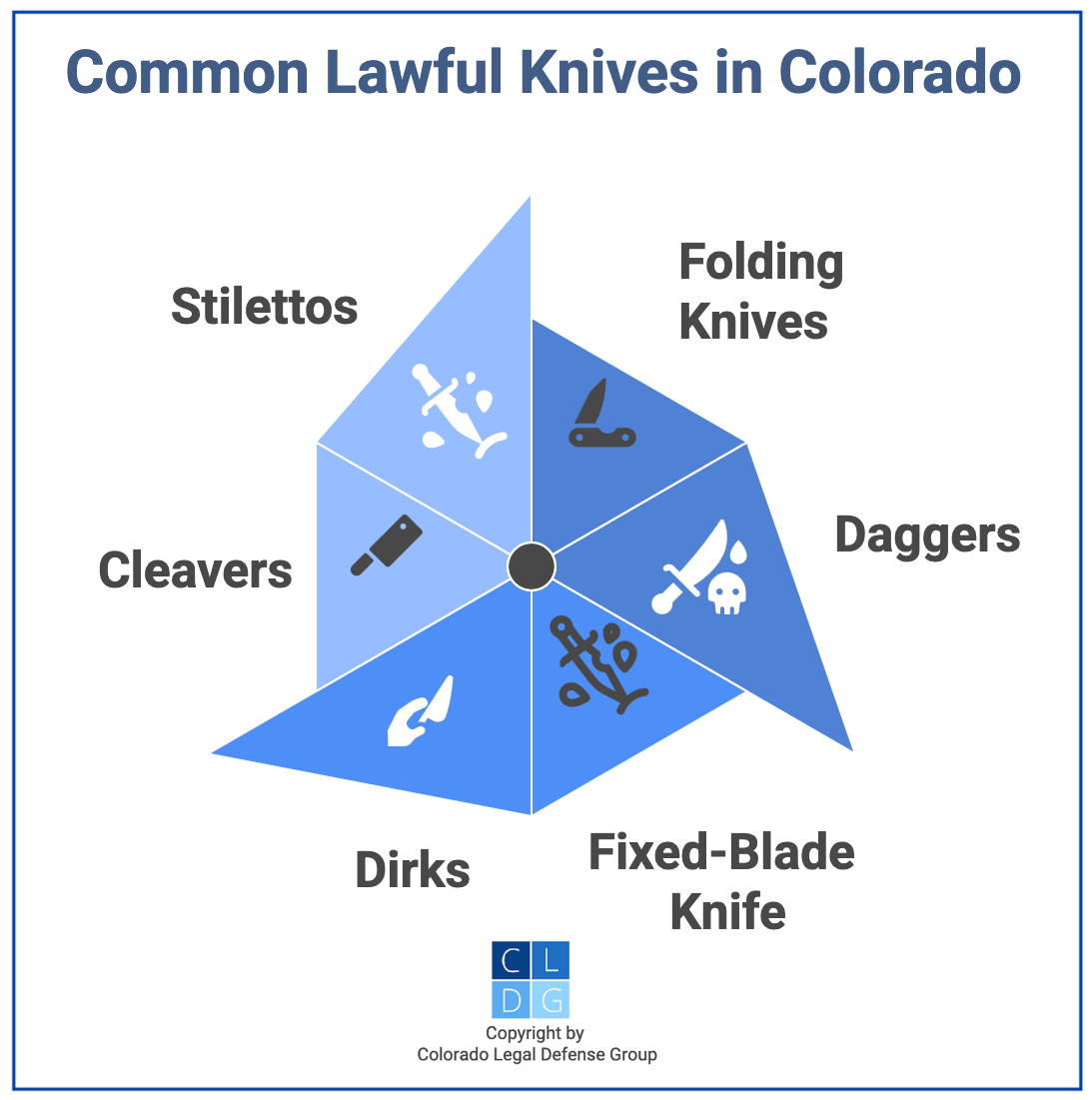
Violating Colorado knife laws can be a misdemeanor or felony, depending on the offense:
|
Knife Crime |
Colorado Penalty |
| Carrying concealed with a blade exceeding 3.5 inches (C.R.S. 18-12-105) | Class 1 misdemeanor: Up to 364 days in jail and/or $1,000. |
| Carrying a ballistic knife (C.R.S. 18-12-102) | Class 1 misdemeanor: Up to 364 days in jail and/or $1,000. |
| Carrying a knife at a school (C.R.S. 18-12-105.5) | Class 6 felony: 1 year to 18 months in prison and/or $1,000 to $100,000. |
Note that switchblades are lawful to carry except in certain cities like Denver.
In this article, our Denver criminal defense attorneys address the following key issues regarding Colorado knife laws:
- 1. Open Carry
- 2. Conceal Carry
- 3. Illegal Knives
- 4. Knife-Free Zones
- 5. Hunting and Fishing
- 6. Defenses
- Additional Reading
1. Open Carry
You may open carry knives in Colorado, even machetes. “Open carry” refers to the practice of carrying knives in a way that makes them visible to others. Examples include:
- Holding in your hand or under your arm;
- Carrying on an outside waistband (OWB) or belt (drop leg or dangle);
- Carrying on a necklace; or
- Carrying in a clip attached to the outside of a bag.1
Continue reading to discover which knives are prohibited and which locations are restricted.
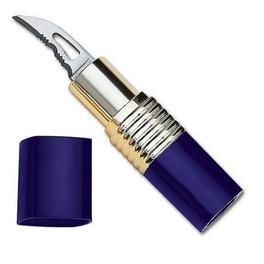
Knives with blades of 3.5 inches or less can be carried concealed in Colorado.
2. Conceal Carry
You may carry knives concealed in Colorado if the blade is 3.5 inches or less. This includes fixed-blade knives as well. Examples of concealed carry include:
- Carrying on a waistband if other clothes are covering it;
- Carrying in a purse or backpack; or
- Carrying in a pocket.
It is usually illegal to conceal carry a knife with a blade longer than 3.5 inches.
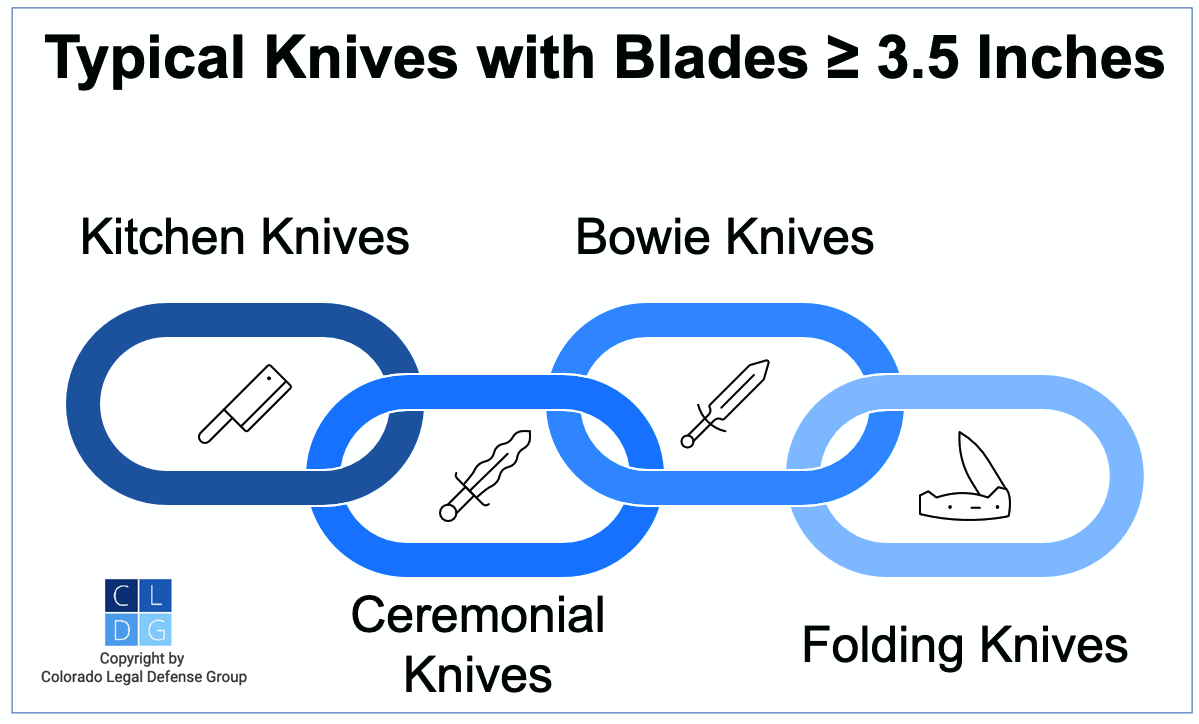
You may lawfully conceal carry knives with 3.5+ inch blades if you are at your own home, property, or place of business. You can also conceal carry these knives in a private automobile (or other private transportation) for lawful protection purposes. There is also an exemption for law enforcement officers.2
CCW permits are usually not necessary to carry concealed knives in Colorado, but you should check with your county sheriff to make sure.
3. Illegal Knives
Blackjacks and ballistic knives are considered “illegal weapons” in Colorado and are unlawful to possess or carry in the state. Ballistic knives have blades that forcefully project from the handle by:
- A spring-loaded device; or
- An explosive charge.3
Note that switchblades and gravity knives are now legal under Colorado state law. Switchblade knives are “automatic knives” that open automatically by hand pressure applied to a button, spring, or other device in its handle. Meanwhile, gravity knives open by the force of gravity.
Note that butterfly knives (a.k.a. balisong knives) exist in a legal grey area. Arguably, they are gravity knives and therefore legal. However, there is no case precedent showing that the repeal of the gravity knife ban applies to butterfly knives.
However, switchblades and gravity knives remain illegal in certain municipalities and cities, including:
- Denver,
- Aurora,
- Boulder, and
- Lakewood.
Recall it is illegal everywhere to conceal carry these knives if the blade exceeds 3.5 inches.4
4. Knife-Free Zones
Deadly weapons such as knives may not be carried on school grounds under Colorado state law. This includes:
- Pre-school;
- Kindergarten through 12th grade (secondary school); and
- Post-graduate (college, technical school, etc., even though the students are not minors).5
There are some exceptions to this rule. You may take knives to school when either:
- The knife remains in a vehicle while at a public or private college, university, or seminary. This does not include lower grades such as pre-K, lower school, middle school, or high school;
- You are in a private automobile (or other private means of traveling), and you are carrying for self-defense;
- You are a school resource officer;6 or
- You possess the weapon for an approved educational program.7
5. Hunting and Fishing
You can carry hunting and fishing knives for sports use. In fact, hunting knives and fishing knives are not included in Colorado’s legal definition of “knife”.
This means you can carry hunting and fishing knives openly or concealed. It does not matter how long the blade is. If you are prosecuted for carrying these knives, you can raise an affirmative defense that they were for hunting or fishing.8
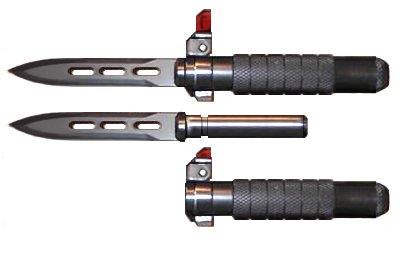
Ballistic knives are illegal in Colorado.
6. Defenses
Here at Colorado Legal Defense Group, we have represented literally thousands of people charged with weapons offenses. In our experience, the following ten defenses have proven highly effective in reducing or dismissing knife-related charges.
- The object does not meet the definition of a knife.
- The blade was 3.5 inches or less.
- The knife was not concealed.
- The knife was for hunting or fishing.
- The knife was on your property.
- You were not on school grounds.
- You did not knowingly carry the knife (perhaps it was planted on you).
- The police found the knife through an illegal search.
- You had no intention of using the knife as a weapon.9
- You were falsely accused.
Another possible defense is state preemption, which occurs when state law overrides a local or municipal law. Preemption typically applies when you are traveling in a private vehicle.10
Example: Bill is carrying a switchblade while driving through Denver en route to Trinidad, where switchblades are legal. A Denver police officer sees Bill and cites him for carrying a switchblade. Though since Bill was in his own car passing through Denver, the charge might be dismissed. Colorado’s law allowing switchblades preempts Denver’s local law prohibiting them.
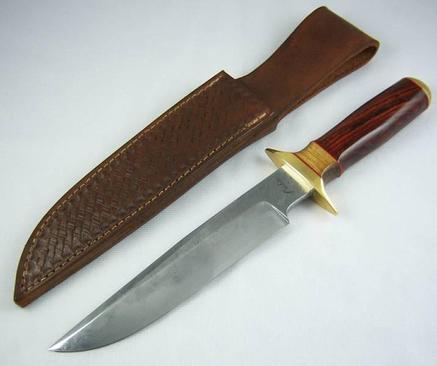
For the most part, you may open carry legal knives in Colorado without prohibitions.
Additional Reading
For more in-depth information, refer to these scholarly articles:
- Criminal Use of Switchblades: Will the Recent Trend towards Legalization Lead to Bloodshed? – Connecticut Public Interest Law Journal.
- Eradicating ‘This Dreadful Knife Problem’: Legislative and Judicial Initiatives against Knife Possession – Youth Justice.
- Man finds 2nd Amendment protects his use of banned switchblade – Wisconsin Law Journal.
- Knives and the Second Amendment – University of Michigan Journal of Law Reform.
- The Knife Crime Problem: Further Developments – Youth Justice.
Legal References
- See C.R.S. 18-12-105.
- C.R.S. 18-12-105. See, for example, People v. ex rel. L.C. (Colo.App. 2017) 486 P.3d 1168.
- C.R.S. 18-12-102. C.R.S. 18-12-101(a.3).
- Noel Brennan, “It is now legal to carry a switchblade in Colorado“, 9 News (August 9, 2017); Colorado SB 17-008; Denver Municipal Code Sec. 38-117 (local ordinance).
- C.R.S. 18-12-105.5.
- C.R.S. 22-32-109.1.
- C.R.S. 18-12-105.5(3).
- C.R.S. 18-12-101(f) (Knife is “any dagger, dirk, knife, or stiletto with a blade over three and one-half inches in length, or any other dangerous instrument capable of inflicting cutting, stabbing, or tearing wounds, but does not include a hunting or fishing knife carried for sports use.”).
- A.P.E., a Juvenile v. Colorado, (Colo. Sup. Ct., 2001) 20 P.3d 1179.
- C.R.S.18-12-105.6.
